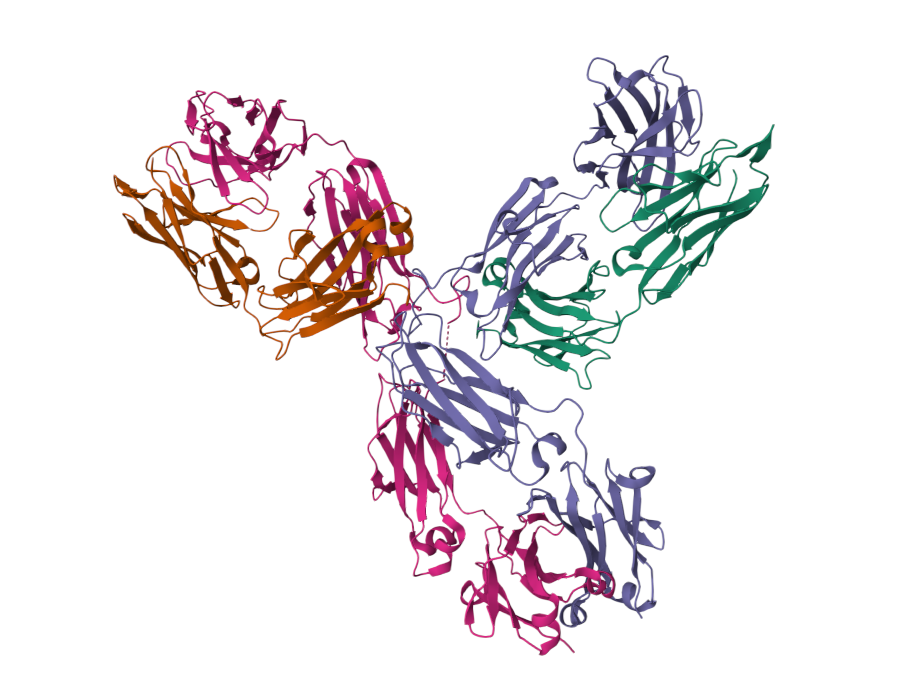
Drug name
Pembrolizumab
Developer(s)
Drug information
Pembrolizumab
Keytruda
Biotherapeutic
Pembrolizumab is a monoclonal antibody that targets the programmed death-1 (PD-1) receptor, thereby inhibiting the interaction between PD-1 and its ligands. It is approved for the treatment of multiple solid tumors, including melanoma, non-small cell lung cancer (NSCLC), small cell lung cancer (SCLC), head and neck squamous cell carcinoma (HNSCC), classical Hodgkin lymphoma (cHL), primary mediastinal large B-cell lymphoma, urothelial carcinoma, and various malignancies within the gastrointestinal tract. Pembrolizumab is administered every three weeks, supported by its pharmacokinetic profile, which includes a terminal half-life of approximately 26 days and a volume of distribution of 7.4 L. Clinical data have demonstrated that pembrolizumab provides improved tumor response.
Keytruda is approved by several SRAs, including FDA, fora wide range of cancers including: Melanoma, Non-small cell lung cancer (NSCLC), Head and neck squamous cell carcinoma (HNSCC), Classical Hodgkin lymphoma, Urothelial carcinoma, Colorectal cancer (MSI-H/dMMR), Gastric cancer, Cervical cancer, Esophageal cancer, Endometrial cancer, Hepatocellular carcinoma (HCC), Triple-negative breast cancer (TNBC), Tumor-agnostic approvals for MSI-H, TMB-H, and dMMR tumors. Keytruda is also approved by EMA for many of the same cancers as in the U.S., although specific indications and line-of-treatment approvals may differ slightly.
Keyruda received accelerated approval
Therapeutic area(s)
- Oncology
- Treatment
Administration route
Intravenous, Subcutaneous
Associated long-acting platforms
Solution
Use of drug
- Administered by a community health worker
- Administered by a nurse
- Administered by a specialty health worker
- Other : Every 3 weeks
Not provided
Dosage
100mg/4mL (25mg/mL) [50 mg lyophilized powder/vial]
200mg
KEYRUDA is given as 200 mg every 3 weeks / 400 mg every 6 weeks. This applies across multiple indications, including melanoma, NSCLC, SCLC, HNSCC, cHL/PMBCL, urothelial carcinoma, MSI-H/dMMR cancers, gastric, esophageal, cervical, HCC, MCC, RCC (with axitinib), endometrial carcinoma (with or without lenvatinib), TMB-H cancers, and cSCC. Pediatric dosing is typically 2 mg/kg (max 200 mg) every 3 weeks for cHL/PMBCL, MSI-H/dMMR, and MCC.
Dosage of the medicine varies according to indication, setting, guidelines and clinical approach
Associated technologies
Not provided
Comment & Information
Developer(s)

Merck is a German multinational science and technology company headquartered in Darmstadt. It operates in three main sectors: healthcare, life sciences, and electronics. Merck is a leading company in pharmaceuticals, biotechnology, and chemicals, providing a wide range of products and services globally.
BiocadDrug structure
Scale-up and manufacturing prospects
The manufacturing process has been scaled up by transferring the process from a donor manufacturing site with a 12500 L bioreactor to two additional recipient sites with 12000 L and 22000 L bioreactors. This scaling up aims to increase the overall production capacity of the drug substance, which is a monoclonal antibody against PD-1. Keytruda generated approximately $29.5 billion in global sales in 2024
1. Helios Gene Gun 2. CELLine Bioreactors 3. 96-well flat-bottom culture plates. Other equipments are not disclosed.
The manufacturing process of pembrolizumab in aseptic conditions includes: 1. Immunization and antibody generation in CHO-K1 cells 2. B Cell isolation and hybridoma formation 3. Antibody expression and purification 4. Cloning and sequencing of immunoglobulin genes 5. Humanization of antibodies 6. Recombinant expression of humanized antibodies
FACS (Fluorescence-Activated Cell Sorting); ELISA (Enzyme-Linked Immunosorbent Assay) Reader; FMAT (Fluorometric Microvolume Assay Technology); Octet Bio-Layer Interferometry (BLI); Amicon Ultra Centrifugal Filters (Millipore); ABI 3730 DNA Analyzer; NanoDrop; Gel Electrophoresis.
Excipients
No proprietary excipient used
No novel excipient or existing excipient used
No residual solvent used
Delivery device(s)
No delivery device
Publications
Monk, B. J., Colombo, N., Tewari, K. S., Dubot, C., Caceres, M. V., Hasegawa, K., Shapira-Frommer, R., Salman, P., Yañez, E., Gümüş, M., Olivera Hurtado de Mendoza, M., Samouëlian, V., Castonguay, V., Arkhipov, A., Tekin, C., Li, K., Keefe, S. M., Lorusso, D., & KEYNOTE-826 Investigators (2023). First-Line Pembrolizumab + Chemotherapy Versus Placebo + Chemotherapy for Persistent, Recurrent, or Metastatic Cervical Cancer: Final Overall Survival Results of KEYNOTE-826. Journal of clinical oncology : official journal of the American Society of Clinical Oncology, 41(36), 5505–5511. https://doi.org/10.1200/JCO.23.00914
Clinical trials frequently include multiple end points that mature at different times. The initial report, typically based on the primary end point, may be published when key planned co-primary or secondary analyses are not yet available. Clinical Trial Updates provide an opportunity to disseminate additional results from studies, published in JCO or elsewhere, for which the primary end point has already been reported.The phase III, double-blind KEYNOTE-826 trial of pembrolizumab 200 mg or placebo once every 3 weeks for up to 35 cycles plus platinum-based chemotherapy, with or without bevacizumab, showed statistically significant survival benefits with the addition of pembrolizumab for patients with persistent, recurrent, or metastatic cervical cancer (primary data cutoff: May 3, 2021). This article reports the protocol-specified final overall survival (OS) results tested in the PD-L1 combined positive score (CPS) ≥1, all-comer, and CPS ≥10 populations. At the final data cutoff (October 3, 2022), the median study follow-up duration was 39.1 months (range, 32.1-46.5 months). In the PD-L1 CPS ≥1 (N = 548), all-comer (N = 617), and CPS ≥10 (N = 317) populations, median OS with pembrolizumab-chemotherapy versus placebo-chemotherapy was 28.6 months versus 16.5 months (hazard ratio [HR] for death, 0.60 [95% CI, 0.49 to 0.74]), 26.4 months versus 16.8 months (HR, 0.63 [95% CI, 0.52 to 0.77]), and 29.6 months versus 17.4 months (HR, 0.58 [95% CI, 0.44 to 0.78]), respectively. The incidence of grade ≥3 adverse events was 82.4% with pembrolizumab-chemotherapy and 75.4% with placebo-chemotherapy. These results show that pembrolizumab plus chemotherapy, with or without bevacizumab, continued to provide clinically meaningful improvements in OS for patients with persistent, recurrent, or metastatic cervical cancer.
Additional documents
Useful links
There are no additional links
Collaborate for development
Consider on a case by case basis, collaborating on developing long acting products with potential significant public health impact, especially for low- and middle-income countries (LMICs), utilising the referred to long-acting technology
Share technical information for match-making assessment
Provide necessary technical information to a potential partner, under confidentiality agreement, to enable preliminary assessment of whether specific medicines of public health importance in LMICs might be compatible with the referred to long-acting technology to achieve a public health benefit
Work with MPP to expand access in LMICs
In the event that a product using the referred to long-acting technology is successfully developed, the technology IP holder(s) will work with the Medicines Patent Pool towards putting in place the most appropriate strategy for timely and affordable access in low and middle-income countries, including through licensing